I am happy to announce the Fall 2020 issue of the Texas Education Review, a student-run journal at UT. Below are a number of the articles from this past issue with so many, if not all, germane to current policy and practice issues in education. Hats off to our students in the College of Education that produced this.
I want to read them all.
-Angela Valenzuela
https://review.education.utexas.edu/
The Texas Education Review is an independent, peer reviewed, student-run scholarly publication based at the College of Education at The University of Texas at Austin.
From Sweatt v. Painter and No Child Left Behind, to charter schools, curriculum policy, and textbook adoption, the State of Texas has played and will continue to play a critical role in shaping education policy in the United States.
The Texas Education Review (TxEd) is located directly on The University of Texas’s campus in the heart of downtown Austin. Its close proximity to the Texas Capitol, Texas Education Agency, and State Board of Education offers unparalleled access to the thought leaders, policy makers, and academics who are driving education policy in Texas. TxEd focuses on analysis of education policy and related issues, with non-exclusive preference given to issues affecting the State of Texas.
TxEd was founded and is operated by PhD students at The University of Texas at Austin’s College of Education, which consistently ranks as one of the best public university graduate education programs in the U.S.
Recent Submissions
(D)riven by neoliberalism: Exploring alternative purposes for higher education
(Texas Education Review, 2020)The value of a degree. Social mobility. Job placement rates. Return on investment. These concepts permeate both the news media and academic discourse about higher education credentials. From provosts to presidents, students ...The State of School Segregation in Texas and the Factors Associated with It
(Texas Education Review, 2020)Brown v. Board of Educ. (1954) officially ended legal (de jure) segregation, but desegregation outcomes overall fell short of this nation’s ideals of equality and justice. As a result, children of color suffer. The purpose ...Using the Technology Acceptance Model to Analyze K-12 Students’ Behavioral Intention to Use Augmented Reality in Learning
(Texas Education Review, 2020)Augmented reality (AR) has gained popularity in K-12 education in the past decades; researchers and educators generally agree that AR is a useful pedagogical tool in teaching because it is grounded on efficient teaching ...Are The Rich Getting Richer? How School District Wealth Predicts Website Traffic Expenditures
(Texas Education Review, 2020)Although considerable education research has focused on how K-12 school districts spend money, no extant literature has specifically examined how these districts invested in online endeavors, most notably website traffic ...Disrupting White Teacher Education
(Texas Education Review, 2020)Recognizing that K-12 and higher education spaces center Whiteness, the authors of this editorial invite other White teacher educator-scholars to disrupt the dominance of Whiteness in university-based teacher education and ...The Expansion of Exemption: Texas’ Districts of Innovation
(Texas Education Review, 2020)In 2015, Texas precipitated a quiet but dramatic shift in public education by allowing school districts to convert to “Districts of Innovation”(DOI) and thereby claim exemptions to many aspects of the education code ...Rural Ways of Knowing in Higher Education
(Texas Education Review, 2020)Colleges and universities are wise to better understand the vital sense of place that underlies rural ways of knowing in higher education. For rural students, going to college is often challenging in large part because of ...The Black (W)hole: Examining Institutional Racism in Doctoral Education, an OrgCrit Perspective
(Texas Education Review, 2020)Centering the role of institutional racism within graduate education remains an understudied topic in existing literature on Black doctoral student socialization experiences at Predominantly White Institutions (PWI). This ...The Córdoba Reform Movement of 1918 and Ecological Systems Theory
(Texas Education Review, 2020)In this essay, I examine the Córdoba University Reform Movement of 1918 through both a historical lens and the application of Urie Bronfenbrenner’s (1979, 1986, 1993) ecological systems theory. Examining the Reform Movement ...Beyond the Spoken Word: Examining the Nature of Teacher Gesturing in the Context of an Elementary Engineering Curriculum for English-Learner Students
(Texas Education Review, 2020)Our research team performed an exploratory analysis of teacher gesturing via a case study of an elementary teacher. We focused on gesturing, a practice found to support both bilingual English learner students’ linguistic ...Where Do Students with Disabilities Enroll in Texas Postsecondary Institutions?
(Texas Education Review, 2020)Although a wealth of research has explained how postsecondary institutions can support students with disabilities, no studies have articulated which postsecondary institutions are best suited to enroll students with ...The 86th Legislative Session Look-Back
(Texas Education Review, 2020)State legislatures govern many of the daily concerns in education, yet the politics at play in shaping legislators’ approaches to pressing education issues remain underexamined. This paper provides an overview of the ...Skin in the Game: The 86th Texas Legislative Session and the Impact of Advocate Diversity
(Texas Education Review, 2020)A large group of advocates and lobbyists influence state-level public education policymaking in Texas. Unfortunately, this group often does not mirror the racial and ethnic makeup of Texas public school students, the ...Teachers in a New Political Landscape
(Texas Education Review, 2020)Teachers’ positionality within the political landscape has evolved rapidly over recent election cycles. In Texas, nationwide teacher advocacy and anti-teacher state legislation motivated teachers to become politically ...A Review of State Investment in Higher Education Affordability and Access During the 86th Legislature
(Texas Education Review, 2020)Postsecondary student demographics are dramatically shifting in the state of Texas, resulting in an increased need for state government resources to ensure college access affordability in the state. It is critical that ...Cross-Cultural Mentoring: What Education Needs Now
(Texas Education Review, 2020)Falling Through the Cracks: Homeless Youth Need Natural Mentors
(Texas Education Review, 2020)The current Every Student Succeeds Act (ESSA), which contains the most recent reauthorization of the McKinney Vento Act (M-V), places a focus on homeless youth that is intended to facilitate access to K-12 education, higher ...Pushing Back Against Deficit Narratives: Mentoring as Scholars of Color
(Texas Education Review, 2020)In this article we share our lived experiences with mentoring. As tenured women professors of color, we push back against the assumption that institutions of higher education are neutral sites, that we have to change to ..."With the Richness of Their Resources”: Honors Alumni Reflect on the Impact of a Service-Learning and Mentoring Program
(Texas Education Review, 2020)Scholars have encouraged universities to more effectively engage with surrounding communities. One example of community engagement is the service-learning partnership between the Plan II Honors Program and the Knowledge ...Through a Pedagogy of Belonging: Creating Cross-Cultural Bridges in Doctoral Programs
(Texas Education Review, 2020)In this article, a student (Jessica) and professor (Julie) with cross-cultural characteristics—such as race, various identities, power dynamics, and backgrounds—offer a thesis that pedagogies of belonging, or educational ...

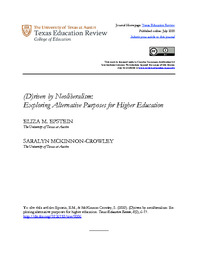
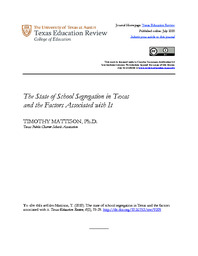
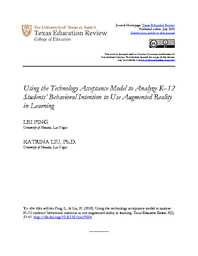
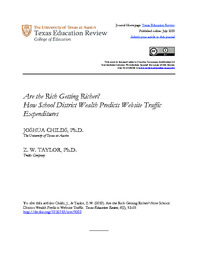
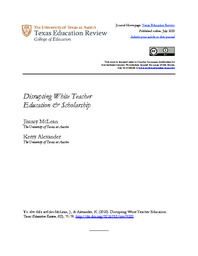
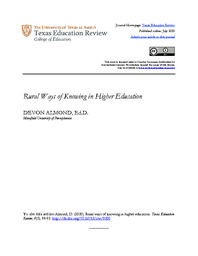

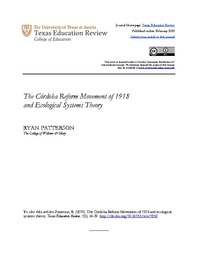
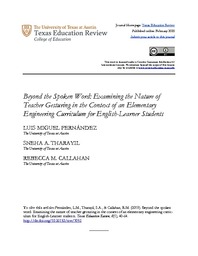
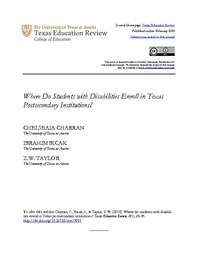
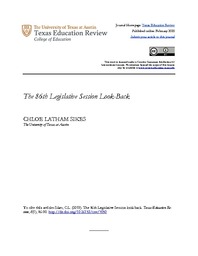
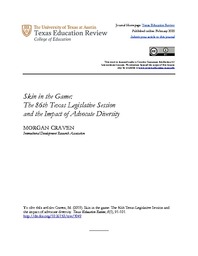
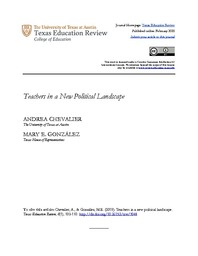
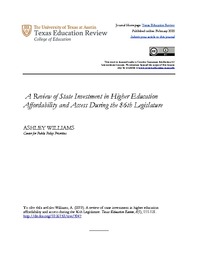
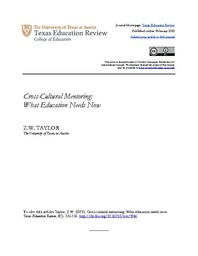
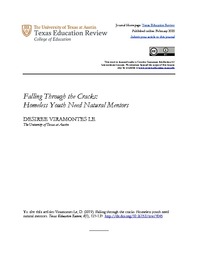
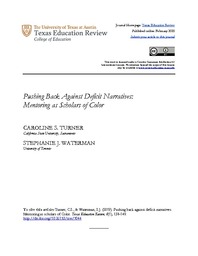
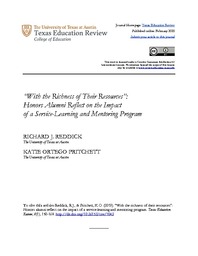
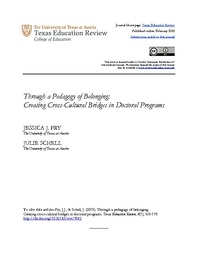
No comments:
Post a Comment